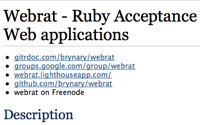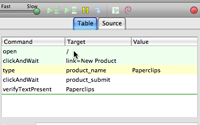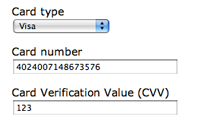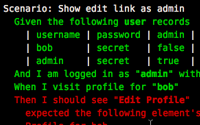Categories
- Active Record
- Active Resource
- Active Support
- Administration
- Ajax
- APIs
- Authentication
- Authorization
- Background Jobs
- Caching
- Code Walkthrough
- Controllers
- Debugging
- Deployment
- eCommerce
- Forms
- Mailing
- Models
- Performance
- Plugins
- Production
- Rack
- Rails 2.0
- Rails 2.1
- Rails 2.2
- Rails 2.3
- Rails 3.0
- Rails 3.1
- Rails 3.2
- Rails 4.0
- Refactoring
- Routing
- Search
- Security
- Testing
- Tools
- Views
Beginning with Cucumber
Cucumber is a high-level testing framework. In this episode we will create a new Rails application from scratch using behavior driven development.
(15 minutes)
Webrat
If you prefer writing integration tests in ruby instead of Cucumber's plain english, consider interacting with Webrat directly as I show in this episode.
(7 minutes)
Factories not Fixtures
Fixtures are external dependencies which can make tests brittle and difficult to read. In this episode I show a better alternative using factories to generate the needed records.
(12 minutes)
Metrics Metrics Metrics
Metric Fu, Metrical, SimpleCov, Rails Best Practices, and more are covered in this episode on metrics.
(7 minutes)
New Gem with Bundler
Creating new gems is easy with the `bundle gem` command. In this episode I will walk you through how this works.
(7 minutes)
Selenium
Selenium is a great way to test your app automatically through a browser. See how it works in this episode.
(9 minutes)
Gemcutter & Jeweler
Gemcutter is a new service for hosting RubyGems, and Jeweler provides an automated way to release versions of a gem.
(7 minutes)
Integrating Active Merchant
In this episode I show how to add Active Merchant's functionality to a Rails application to make a fully-functional checkout process.
(18 minutes)
Metric Fu
Metric Fu is a compilation of several tools to help find areas of code that could be improved. In this episode I show you how to setup this tool on the railscasts.com source code.
(9 minutes)
More on Cucumber
There is a lot more to Cucumber than I showed in an earlier episode. See how to refactor complex scenarios in this episode.
(18 minutes)










